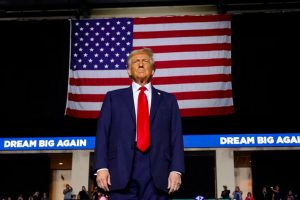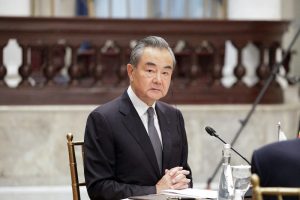(ATF) Huawei Technologies’ founder and CEO Ren Zhengfei expects new business opportunities, such as unmanned coal mining, to offset the impact of the US chip ban on his smartphone business and he admits it’s “extremely unlikely” that Washington will lift its bans on the group.
Ren spoke to reporters this week after the opening of an “intelligent” mining innovation lab jointly set up by Huawei, the government of northern China’s Shanxi province and two local companies. It was the first time the Huawei founder and CEO has spoken publicly on the US-China tech war since Joe Biden became US President.
Ren said he hopes the new US government will adopt “more open policies” that are “in the interests of US companies and the US economy as a whole”.
Huawei was labelled a national security threat under the Trump administration, which took actions to hamper the company’s access to key software and components.
Washington alleged that Huawei’s networking equipment could be used to spy on Americans. Huawei denied those claims many times.
“Both the US and China need to develop their economies… As humanity keeps making progress, no company can develop a globalized industry alone,” Ren said.
The Huawei boss tried to appeal to the economic interests of American companies, and said some of them have seen their businesses hit by not being able to supply products to his company.
“If Huawei’s production capacity can be expanded, that would mean more opportunities for US companies to supply too. I believe that’s going to be mutually beneficial. I believe that (the) new administration would bear in mind such business interests as they are about to decide their new policy,” Ren said.
BUSINESS CAN WEATHER THE STORM
However, Ren said he thinks it “extremely unlikely” that Washington would reverse Trump’s move to put Huawei on the so-called Entity List, an export control blacklist that has restricted Huawei’s access to key software and components such as Google’s Android operating system, computer chips from Intel and smartphone chips from suppliers such as Qualcomm and TSMC.
The US chip ban cost Huawei the No. 1 spot in the global smartphone market. After the ban took full effect in September, Huawei fell out of the world’s top five smartphone vendors in the fourth quarter (Q4) and were ranked sixth, after being the market leader in the second quarter.
But, Ren said he was confident about Huawei’s survival, as the company had managed to grow both its revenue and profit in 2020 despite the US actions.
“We can still survive even without relying on phone sales,” he said, without giving specific financial figures for 2020.
Huawei’s revenue for 2019 totaled 858.8 billion yuan ($122.97 billon) while net profit came in at 62.7 billion yuan.
TAPPING INTO MINING
Today, Huawei also sees the mining sector as an untapped area with high growth potential. 5G technology makes unmanned mining as an option to garner resources from regions with a harsh climate, such as the Arctic, Ren noted.
“China has around 5,300 coal mines and 2,700 ore mines. If we can serve these 8,000+ mines well, we could expand our services to mines outside China. Unmanned mining could be of great significance to mines in the Arctic regions in Canada and Russia. Very few people are willing to live on the tundra areas because of the harsh environment. This makes resource utilization there very inefficient. The whole world would benefit if we could utilize those resources through unmanned mining,” he said.
SELF-RELIANCE PROGRAM
To counter the impact of US sanctions, Huawei launched a self-reliance program and now has “more ways to overcome difficulties”, Ren said.
After being blocked from having access to Google’s Android operating system, Huawei has developed its own system, Harmony. Aside from its established businesses such as telecom gear, routers, and smartphones, it is also exploring new business areas such as cloud services and “smart” cars to weather the storm.
Ren said although Huawei’s smartphone shipments have declined, the success of Apple’s iPhone 12 in Europe showed the quality of Huawei’s 5G networks.
“The iPhone 12 has been able to achieve download speeds of 1.82 Gigabits per second (Gbps), making it the best in the world. Many high-end device users in Europe use iPhones, and the way those phones operate on our networks in Europe actually is a sign we are also doing well.”
After the Trump administration banned Huawei’s 5G telecom equipment in the US, countries such as Australia, the UK, and Sweden – which have also had significant political differences with Beijing – followed suit. But Huawei has helped build 5G networks in European cities such as Berlin, Madrid, Zurich, Geneva and Amsterdam, as well Asian regions such as Seoul, Bangkok, and Hong Kong.
‘WE’LL NEVER SELL SMARTPHONE BUSINESS’
In November, Huawei sold Honor, its budget smartphone brand, to allow the unit to regain access to components and survive. Then in January, there were reports that Huawei was in talks to sell its premium Mate and P smartphone brands.
But Ren said Huawei would “never” sell its smartphone business, or its “device” business in a larger sense, which includes TV sets, security systems, and radars used for self-driving vehicles.
And he said Huawei would NOT fund the manufacture of computer chips.
Huawei’s three core business segments are consumer, telco and enterprise businesses.
In 2019, the consumer business, which included smartphones, laptops, routers, and wearables, accounted for the largest share – 54% – of Huawei’s total revenue. It was also the fastest-growing segment with 34% growth from a year earlier.
The telco business contributed to 34.5% of the Chinese tech firm’s revenues, and enterprise business 10.4%.
























